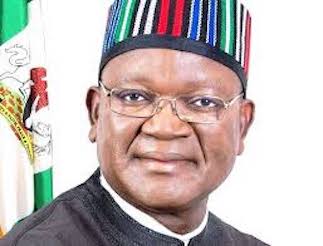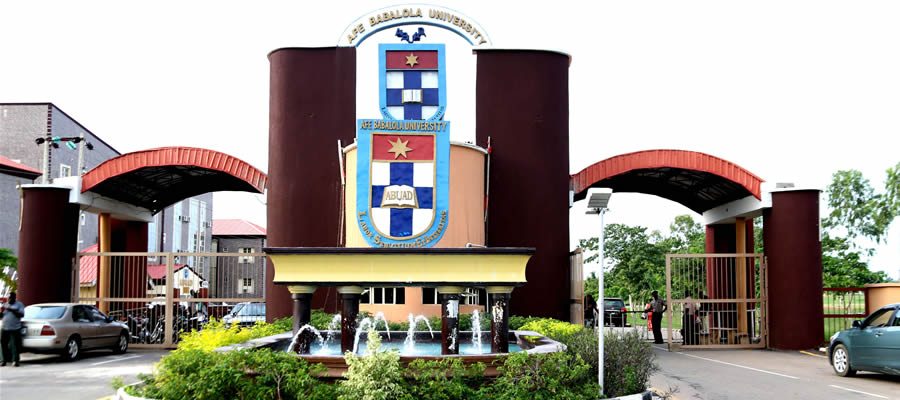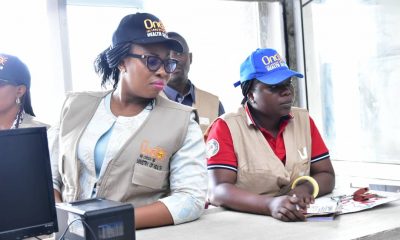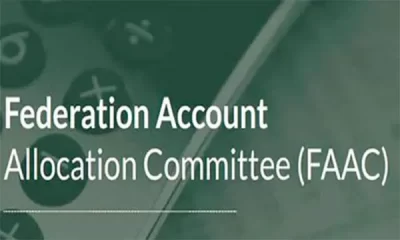Education
Benue Sets Conditions For August 4 Schools Reopening

From Vincent Nyinongu, Makurdi
The Benue State Government has set conditions for the August 4 schools reopening for terminal classes in the state on in line with Federal Government directive on school resumption.
Commissioner for Education, Prof.
Dennis Ityavyar revealed this while briefing journalists after a meeting with Governor Samuel Ortom at Benue People’s House, Makurdi yesterday.According Prof. Ityavyar, any school willing to reopen on the set date of August 4th, 2020 must carry out proper fumigation of the premises and provide for water and soap to guarantee constant hand washing in line with the protocol on safety measures as recommended by NCDC.
The Commissioner also said sitting arrangement in every class must be at two meters distance with one person each per seat. He also tasked schools on the need to make provision for a mobile means that will facilitate movement of people during emergencies for prompt medical attention.
Commenting on Government’s promise to return schools to their respective owners in August this year, Prof Ityavyar said due to present crises occasioned by the pandemic coupled with complaints received from the people bothering on the move to returning schools to the owners, Governor Ortom has set up a committee headed by the SSG, Prof. Anthony Ijoho to resolve everything and report back to him in one week for necessary action.
CEHRD Trains Bayelsa Women on Business Growth
From Tayese Mike, Yenagoa
A Non-Governmental Organization, Centre For Environment and Human Rights Development (CEHRD), has advised business women in Bayelsa State to think and dream big in growing their businesses, saying that an entrepreneur always thinks of what innovations he or she will introduce into her business to make it outstanding.
Speaking in Yenagoa during an entrepreneur training organized by CEHRD with support from Embassy of Netherlands in Nigeria for business women from Bayelsa East Senatorial District at Ogbia, Franklin Nelson said that the aim of the training was to introduce participants to entrepreneurship and encourage them to enter into any businesses of their choice in order to help themselves and their families economically.
Franklin, who facilitated the training noted that many people operating small businesses hardly have plans of growing their businesses beyond the level of petty trading adding that many of the big businesses existing today started small.
“The essence of training you is to change the thinking and ideas about investment and empower you with business skills in order to make you economically self-dependent”.
He advised them on the need for cleanliness and safety environment for their businesses to succeed.
Declaring the training open, David Vareba, Head of Human rights and governance programme of the CEHRD disclosed that the training was part of a human rights project aimed at empowering women to begin to assert their rights and be in position to fight gender based violence, especially at this COVID 19 pandemic period.
According to him, the entrepreneurship training was aimed at empowering women economically to enable them muster the economic strength to be self-reliant.One of the participants Mercy Idaba thanked CEHRD for the training assuring that she will put all that she has learnt into use as a business woman.
Education
ICPC, COREN Working to Curb Quackery in Engineering – Don

Former Registrar, Council for the Regulation of Engineering in Nigeria (COREN), Prof. Adisa Bello said the council is collaborating with the Independent Corrupt Practices Commission (ICPC), to curb quackery in Nigeria.
Bello stated this in Bauchi on Monday during a public lecture and launching of a magazine by the final year students of Engineering Department, Abubakar Tafawa Balewa University (ATBU), Bauchi.
According to Bello, COREN has an Engineering Regulatory Monitoring Unit visible and working in 29 states of the country.
“If the unit finds anyone culpable of quackery, the person will be handed to the ICPC for further prosecution.
“COREN with the council for regulation of Engineering in Nigeria started in 1970, and its laws were amended in 1992, 2004 and 2018.
“The specific one I’m referring to is the amendment in 2018, which categorically gave COREN the mandate to prosecute offenders of engineering,” he said.
He warned that anybody that was not a registered practitioner in engineering and practicing engineering would be prosecuted by COREN.
“And COREN is doing everything humanly possible to ensure that this is done. COREN currently has a memorandum of Understanding with the Independent Corrupt Practices Commission, and this commission is doing everything possible to ensure that offenders are prosecuted,” he said.
Bello, also a lecturer in the department of Mechanical Engineering, ATBU, recounted how a multi-billion Naira 21 storey building collapsed in Lagos, where COREN did investigation, after which some engineers were found wanting and handed over to the ICPC for prosecution.
“COREN has an investigative panel and once this panel establishes that someone is culpable, it takes you to the ICPC and then straight to the court.
“In my day, we normally write examinations for qualifications.
”We have a situation currently where an individual came with a fake result and we called on the ICPC and they have done all their investigations, and found the person culpable and right now he is under prosecution,” he said.
The don called on higher institutions and academics to ensure that all engineering programmes were properly accredited by the National University Commission (NUC) and COREN.
In a paper entitled: Smart Cities and the role of Engineering and Technology in building the Urban future, Dr. Ibrahim Ikara, Head of Department, Civil Engineering, ATBU, said engineers played a critical role in smart cities.
Ikara said that this could be through the design of modern infrastructure, disaster resilient systems and eco-friendly neighborhoods.
Represented by Muhammad Suleiman, the don listed some of the challenges of building smart cities in developing nations to include infrastructure deficit, limited funding, and low level of digital literacy among citizens.
He urged policymakers to prioritise Science, Technology, Engineering and Mathematics (STEM), to achieve the set goals.
Education
Afe Babalola Canvasses Better Education Sector to Check Insecurity

Founder of Afe Babalola University, Ado-Ekiti (ABUAD), Afe Babalola, has identified Nigeria’s declining educational standards as a key driver of the country’s escalating crime rate.
The legal luminary spoke recently during a courtesy visit by a delegation from Ekiti State University (EKSU), led by its Vice-Chancellor, Prof.
Joseph Babatola Ayodele.According to him, “half education is more dangerous than no education.
Many of those engaged in criminal activities today are products of a failing educational system. We must urgently rewrite Nigeria’s educational narrative to foster national development and security.”Babalola challenged policymakers, institutions, and stakeholders to prioritise research grants, innovation, and academic excellence as critical tools for national progress.
In her welcome address, ABUAD’s Vice-Chancellor, Prof. Smaranda Olarinde, lauded Babalola’s visionary leadership, crediting him for establishing the university as a trailblazer in agriculture, pharmaceuticals and quality healthcare education and delivery.
She spotlighted the peerless and paperless ABUAD Multi-System Hospital, which leading healthcare stakeholders have endorsed as the “Well-equipped hospital in Sub-Saharan Africa” as the nation’s antidote to medical tourism.
Taking cognisance of the under-representation of women in the visiting EKSU delegation, the Vice Chancellor canvassed greater gender balance in leadership, just like in ABUAD, where the Vice Chancellor, Registrar and the Librarian are ladies among several leaders in the 15-year-old university.
Responding, the visiting VC praised Babalola as “an unrepentant philanthropist and proud alumnus, who constantly adds value to society.”
He expressed admiration for ABUAD’s state-of-the-art infrastructure, and called for deeper collaboration between the two institutions in agriculture, research and student exchange programmes.
“We have much to learn from ABUAD Farm. With 14 hectares of tomato farms at EKSU ready for harvest, we recognise the need to deepen expertise in agriculture, a vital sector for Nigeria’s future,” Ayodele remarked.
Education
JAMB Inaugurates Special Committee on Examination Infraction

The Joint Admissions and Matriculation Board (JAMB) has inaugurated a special committee to investigate cases of technology-driven malpractice detected during the 2025 Unified Tertiary Matriculation Examination (UTME).
Inaugurating the 23-member committee in Abuja yesterday, JAMB’s Registrar, Prof.
Ishaq Oloyede, expressed concerns over the rising sophistication in perpetrating exam fraud.Oloyede revealed that the results of 6,458 candidates remained under investigation for alleged involvement in high-tech cheating.
“This year, we came across a number of strange things and we felt that it would be better if we expand our resources.
“We believe that God has endowed this nation with a lot of resources that we can tap from,” Oloyede said.
He noted that malpractices had evolved beyond traditional schemes into “technologically sophisticated forms,” including multiple cases of biometric and identity fraud by some accredited CBT centres and candidates.
Oloyede stressed the need for urgent action to protect the credibility of examinations.
“Examination malpractice is something that we must fight with every pinch of blood in our veins.
“This is because unchecked fraud could harm several sectors and tarnish Nigeria’s image,” he said.
The registrar disclosed that while 141 cases of “normal” exam malpractice had been sent to JAMB’s disciplinary committee, the committee would handle the “extraordinary infractions,” such as image blending, albinism falsification, finger pairing, and attempts to breach some CBT centres’ Local Area Network.
He listed the terms of reference of the committee to include: Investigate all the cases of image blending, finger blending, false claim of albinism and result falsification in the 2025 examination.
“Identify the methods, patterns, tools, and technologies used to perpetrate this infraction.
”Review current examination and registration policies and recommend improvements,” he said.
Other terms of reference, he said, are to determine the culpability or otherwise of each of the 6,458 suspected candidates whose results, excluding the albinism group, are still being withheld, among others.
“We have chosen three weeks because justice delayed is said to be justice denied.
“In about four weeks, admission will close. And we believe that those who are found not to be guilty should have the opportunity,” he added.
Responding, the committee chairman Dr. Jake Epele, thanked Oloyede’s leadership and pledged the committee’s commitment and dedication to the assignment.
“Examination malpractice is not just a breach of rules. It is a direct assault on integrity, merit, and the future of our nation’s youth.
“The task before us is therefore a sacred one. I believe that everyone in this committee, you don’t have a committee job. You have a call from God Almighty.
“The call is to defend the credibility of our examination, restore public confidence, and ensure that diligence and honesty remains the true pathway to opportunity,” he said.
Members of the committee include Prof. Muhammad Bello, Prof. Samuel Odewummi, Prof. Chinedum Nwajiuba, Prof. Tanko Ishaya, Prof. Ibe Ifeakandu, and Police Commissioner Fatai Owoseni (rtd.)
Others are: Dr Chuks Okpaka of Microsoft Africa, and the President of the National Association of Nigerian Students, among others.






























